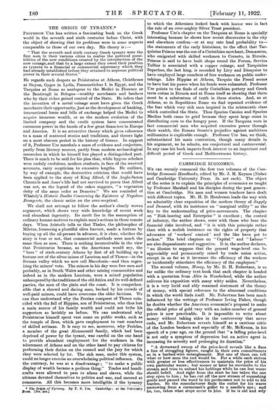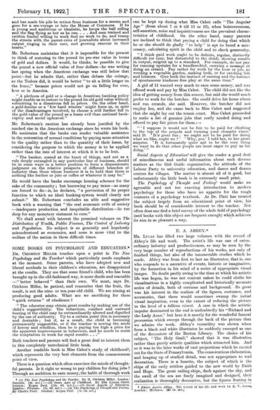CAMBRIDGE ECONOMICS.
Wz can warmly commend the first two volumes of the Cam- bridge Economic Handbooks, edited by Mr. J. M. Keynes (Nisbet
and Cambridge University Press. 5s. net each). The object of the series is to explain the principles of economics as taught by Professor Marshall and his disciples during the past genera- tion at Cambridge. Six men and women teachers have dealt with different topics. Mr. H. D. Henderson leads the way with an admirably clear exposition of the modem theory of Supply and Demand, with its insistence on "marginal utility" as the key to the understanding of price-movements. The chapter on "Risk-bearing and Enterprise" is excellent ; the control of industry, the author shows, rest i with those who bear the financial risks involved, and "it is with this principle rather than with a mulish insistence on the rights of property that advocates of 'workers' control' and the like have got to reckon." The brief chapters on " Capital " and " Labour " are also dispassionate and suggestive. It is, the author declares, "an illusion to suppose that the general wage-level can be appreciably and permanently raised by trade union action, except in so far as it increases the efficiency of the workers or incidentally stimulates the efficiency of the employers."
The second volume, Money, by Mr. D. H. Robertson, is so far unlike the ordinary text-book that each chapter is headed with a quotation from Alice in Wonderland, while the author enlivens his exposition with many witty asides. Nevertheless, it is a very lucid and ably reasoned statement of the theory of money, with special reference to the abnormal conditions in which the world finds itself. Mr. Robertson has been much influenced by the writings of Professor Irving Fisher, though he doubts whether the American economist's proposal to make the official price of gold vary with an index-number of general prices is now practicable. It is impossible to write about money without taking sides in the controversy that never ends, and Mr. Robertson reveals himself as a cautious critic of the London bankers and especially of Mr. McKenna, in his
speech of a year ago, on the ground that "a falling price-level is not only a symptom of depression but an active agent in increasing its severity and prolonging its duration."
"A downward swoop of the price-level reveals like a flare a line of struggling figures, caught in their own commitments as in a barbed-wire entanglement. Not one of them can tell what or how soon the end would be. For a while each strives with greater or lase effectiveness to maintain the price of his own particular wares ; but sooner or later he succumbs to the stream and tries to unload his holdings while he can lest worse should befall. And right from the start he has taken the one step open to him ; he has cut off the new stream of enmeshing goods and passed the word to his predecessor not to add to his burden. So the manufacturer finds the outlet for his wares narrowing from a cormorant's gullet to a needle's eye;. and he, too, takes what steps occur to him. If he is old and wily
and has made his pile he retires from business for a season and goes for a sea-voyage or into the House of Commons. If .he is young and ambitious or idealistic, he keeps the ball rolling and the flag flying as hot as he can. . . . And men trained and (within limits) willing to work find no work to do, and tramp the streets with the parrot-cries of journalists about increased output ringing in their ears, and growing rancour in their hearts."
Mr. Robertson maintains that it is impossible for the present to think of restoring to the pound its pre-war value in terms of gold and dollars. It would, he thinks, be possible to give the pound a new official value of four dollars—he was writing last spring when the American exchange was still below that point—but he admits that, rather than debase the coinage, as the Tudors did, it would be better "to sit a little longer on the fence," because prices would not go on falling for ever, here or in America.
• "A plethora of gold or a change in American banking policy might enable us to restore to the pound its old gold value without submitting to a disastrous fall m prices. On the other hand, a gold-famine or a few hard winters' might force us, in spite of the disadvantages involved, to choose a still further fall in the gold-value of the pound as a lesser evil than national bank- ruptcy and social upheaval."
Mr. Robertson's caution has already been justified by the marked rise in the American exchange since he wrote his book. He maintains that the banks can render valuable assistance in the restoration of normal conditions by paying more attention to the quality rather than to the quantity of their loans, by considering the purpose to which the money is to be applied rather than the rate of interest at which it is to be lent.
"The banker, seated at the heart of things, and not as a rule deeply entangled in any particular line of business, should be in some ways in a better position to form a dispassionate judgment on the relative prospects of different branches of industry than those whose business it is to hold that there is nothing like leather or jute or coffee or whatever it may be."
He would have the banks encourage housing schemes for the sake of the community ; but borrowing to pay taxes—as many are forced to do—is, he declares, "a perversion of its proper function to which an ideal banking-system would clearly not submit." Mr. Robertson concludes an able and suggestive book with a warning that "the real economic evils of society —inadequate production and inequitable distribution—lie too deep for any monetary ointment to cure."
We shall await with interest the promised volumes on The Distribution of Wealth, Public Finance, The Control of Industry and Population. No subject is so generally and hopelessly misunderstood as economics, and none is more vital to the welfare of the nation in these difficult times.



































 Previous page
Previous page